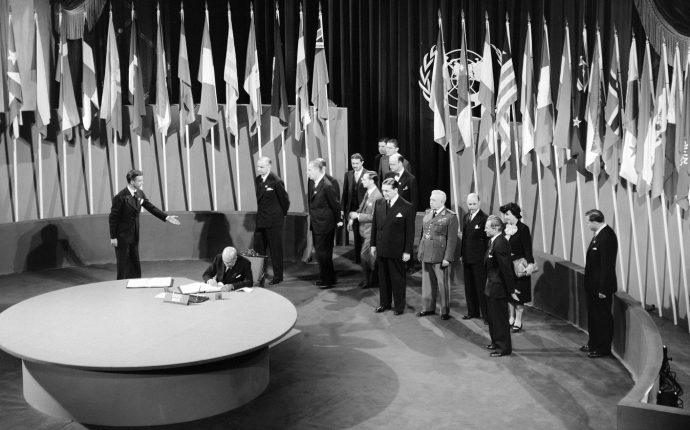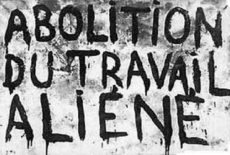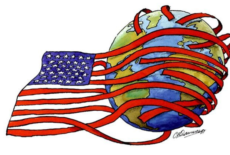Achieving Justice in International Relations – The case of humanitarian intervention
I. Introduction
Throughout history, many people discussed what is a just war, and when is it just to resort to violence. Most of the academic work aimed to come up with a standardized framework regarding the just conditions to use force. In the 21st century, we believe international law is the flag bearer of the just war tradition, notably in its aim to provide a legal framework governing the resort to use of force. Especially after the Second World War and with the creation of United Nations Charter, international law has become the common ground of reference in the matters of peace and war. UN Charter has an unparalleled legitimacy with universal membership. Many countries perceive the Charter as the constitution of the world, undermining partly their sovereignty. Moreover, a certain moral authority is assigned to the Security Council over the matters of maintaining security, utilizing executive power to protect the international order and enforce peace.
Despite these developments, international law is under heavy scrutiny, especially in the post-Cold War era, due to its shortcomings. Some believe that the UN Charter “has fallen out of sync with modern notions of justice” (Glennon 1999, cited in Orford 2013) and that it should be disregarded since it is unable to engage with the effective morality of the contemporary world (Walzer 2015, 100-109). This paper will treat the following question: what is the most viable option for achieving justice in international relations: staying loyal to international law and formalism, despite its flows, or adopting moral internationalism? We will cover this tension through a rigorous analysis of the moral and the legal aspects in relation to humanitarian intervention, which has become a major modality of moral internationalism and a prime example of international law’s shortcomings in achieving justice in particular cases, such as Kosovo, in 1999. Should NATO’s decision to resort to force without a Security Council authorization be an exception or a precedent?
We will start by analyzing the development of international law. Focusing on the UN Charter, we will explain the importance of the moral authority that is assigned to it and to the Security Council in achieving justice and maintaining peace in world politics. We will then briefly look at the shift towards moral internationalism through the example of humanitarian interventions and its history. The last part of our brief work will deconstruct and address moral internationalism through various arguments to finally demonstrate that formalism should be the path to follow.
II. Humanitarian Intervention in the Framework of International Law
The drafting of the Charter of the United Nations symbolized the collective will of the political community to embed the criminalization of war in a legal framework. From an institutional perspective, this collective wish was clearly understandable. Having finally put an end to the Second World War and its terrible atrocities, the Allies wanted to codify the new rules supposed to restrain the use of force, thus providing an “institutional guarantee” (Koskenniemi 2002, 160) reducing the margin of uncertainty for the state actors in the international system.
Even if many people initially saw the United Nations as a chimera, notably because it was more of “an Alliance of the Great Powers embedded in a universal organization” (Mazower 2009, 7) than a genuine supranational institution, it still represented the crystallization of a certain collective ethical perception of the conditions needed to go to war and demonstrated the true ambition to erect the law as the central pillar governing the interstate relations. The hegemonic position of the new permanent members of the Security Council gave it – ab ovo – a strong validity that led it to become, with the time, a genuine and commonly perceived moral authority.
Most scholars share the idea that this culture of adhering to the law and formalism prevailed until the end of the Cold War. Nevertheless, the 1990s, and especially the NATO intervention in Kosovo in 1999, were the symptoms of a profound paradigm shift. In fact, the nascent trends regarding humanitarian intervention have to be analyzed in the context of a broader trend of moral internationalism. The crisis in Kosovo could be described as a turning point, as it symbolizes a terrible dilemma in which international law’s inability to produce military action was deemed against the moral imperatives (Simma 1999, 2), which resulted in abandoning the law in favor of military humanitarianism. However, Kosovo is not an isolated case, and moral arguments have gained significant force in international relations in the post-Cold war period (Orford 2013, 83).
Humanitarian action has become “a dominant frame of reference for Western political intervention in scenes of misfortune around the world” (Fassin 2012, 223). However, this relation towards humanitarianism has a long history and the perception of who deserve to be saved is constantly evolving, renewing the normative structures through which states decide to intervene (Finnemore 1996, 10). The central evolution consists in the fact that, nowadays, a universal norm of humanity exists, whereas in the past, humanitarian interventions were conducted to save similar groups, such as Christians (Ibid, p. 2).
III. Critical Analysis of the Rise of Moral Internationalism
Walzer, like Kant, dismisses the possibility of achieving peace and justice through international law, because the law fails to reflect on the universally shared moral code (Walzer, 2015, 100-109). He further suggests that international law has become uninteresting as it fails to engage with the morality the real world. It would be “arrogantly insensitive to the humanitarian dilemmas involved” (Koskenniemi 2002, 163) to stand by a strict formalism and saying that it is illegal to intervene militarily without Security Council authorization. However, we argue that taking action based on moral arguments creates a slippery slope, and runs a serious risk of undermining international law. Should we then, abandon formalism and the UN Charter’s restrictions and join forces with moral internationalism, follow our impulse and disregard the law?
In the post-Cold war era, the moral internationalism moved the world’s agenda from a moral duty to intervene to a responsibility to protect (Orford 2013, 99). Security Council responded to the assigned responsibility, as it authorized force and applied its jurisdiction in cases of humanitarian crisis or civil war (Orford 2013, 98). It positioned itself as the main agent of “a rational, cosmopolitan international law to tame nationalist passions and local grabs for power” (Orford 1999, 679) and as guarantor of values such as peace and human rights.
However, we think that this narrative should be deconstructed in many regards. Doing so would enable us to see what is missing from this new discourse. A critical approach would further enable us to observe the new risks of following the discourse of military humanitarianism. An alternative reading, provided by Orford, suggests that the humanitarian intervention stories operate at an ideological level, promoting the new liberal world order (Orford 1999, 679-711). Drawing upon the feminist and postcolonial theories, Orford suggests that the narratives operate in the realms of “identification, imagination, subjectivity and emotion”. The narratives invite the reader to identify with the potent character of NATO or the Security Council, through presenting an image of the third world as lacking power, authority and competence. This image of the third world has a spillover effect on creating an implicit cognitive dichotomy such as the one between the civilized folks and the savages, in the case of western citizens and third world citizens.
Invitation of the reader to “identify with a white, violent, masculine hero” is problematic, as it limits the objective grounds to understand the impact of the “hero’s journey of action and self validation” on the humans that are affected. What is missing is the agency and potency of the people of the third world. The possibility of these people to shape their communities and their ability to govern themselves in a peaceful manner is disregarded (Orford 1999, 695). Also, the military humanitarianism blatantly disregards the relationship of imperialism and internationalism, and “the continued exploitation, atrocities and dispossession carried out in the name of freedom and democracy” (Ibid, 695).
Behind the idea of saving the world from violence, some terrible things occur, which are mostly deemed as unavoidable (Koskenniemi 2002, 161). The dilemma of aerial bombardment points to the ingenuity here. The relationship between the moral duty and the lawfulness of killing 500 civilians in the case of NATO intervention in Kosovo is problematic (Koskenniemi 2002, 161-174) We would suggest that it reveals the unequal values attached to human lives, which points to the hierarchies of human lives inherent in humanitarian intervention (Fassin 2012, 242). Despite the availability of operating on lower altitudes, interventionists risk and effectively take lives of hundreds of civilians in order to protect themselves in an operation that is for the sake of humanity and human consciousness. This, and the story of Médicins Sans Frontières (Ibid, 223-242), reveal the sense of sacrifice that is involved, which is born out of unequal valuation attached between the citizens of civilized, liberal nations, and the sacrificeable lives of the “third world” citizens (Ibid, 231). We argue that the bombing revealed the nature of the international order, which lay not in the principles of humanitarianism but “in the will and power of a handful of western leaders” (Koskenniemi 2002, 171). No matter how hard international lawyers try to justify the killing of 500 civilians through a shallow and dangerous ethical reasoning, (Ibid, 161-171), there is something deeply ironic with normalizing such a result.
It is not a politically innocent claim to speak on behalf of humanity’s law (Orford 2013, 106) and executing power grounded on moral arguments. Although the normative structures are evolving through time, they are far from being universally agreeable. Moral internationalism, which tends to “understand itself as the representative of the reason” (Ibid, 107) is in fact in the realm of politics. It could be suggested that “the turn to ethics, too is a politics” (Koskenniemi 2002, 173). This turn reveals the political nature of such decisions as it reveals the insufficiency of official behavior based on rational standards. Liberal internationalism often assumes neutrality or rationality in decision-making (Ibid). Regardless of the language of moral compulsion, we argue that humanitarian intervention remains per se a deeply political act and it cannot hide behind the disguise of neutrality and rationality.
IV. Conclusion
Then, what is our best hope in achieving justice? Is it in fact achievable and is there a thing such as universal justice? Humanitarian intervention is the prime example of a political decision, affecting millions of lives, and the case of Kosovo is the best example of revealing the inability of the law to respond to a humanitarian crisis. However, insistence on rules and processes is a strategy of democratic hope, as formalism is a universal ground “embedded in a culture of restraint, a commitment to listening to others claims and seeking to take them into account’’ (Koskenniemi 2002, 173). If we abandon the culture of restraint, we might end up in the wrong end of the slippery slope, unable to set limits to the impulses on the decision makers. (Ibid, 174) The anti-legalist position of Walzer parallels the anti-legalist position of Kissinger, as both understood legalism as “a barrier to take action” (Orford 1999). United-States’s self-proclaimed role of trustee of the international order is not reasonable, as even their allies “remain unconvinced on good normative grounds of its paternalistic claim to unilateral leadership” (Habermas 2003, 707). Each party should relativize its views to the interpretative perspectives of equally entitled others.
Thus, loyalty to multilateralism and authorization under international law are vital for our prospects. Even the good hegemon “cannot know whether what it maintains is in the interest of others to do is, in fact, equally good for all” (Ibid, 708). We may conclude by arguing that our only viable option is to rely on the development of international law, which is the only common ground that can offer “an equal and reciprocal hearing for the voices of all those affected” (Ibid). We should not disregard international law and the political processes on common grounds, and get carried away by identifying with the hero of the intervention narratives. For the sake of the development of international law, especially for the achievement of justice in particular cases, formalism should reflect on itself, and facilitate political contestation, with “a program of openness and inclusiveness, rather than shedding the pretentious of objectivity” (Koskenniemi 2002, 174-175). Such self-reflection is our best hope in redeeming cosmopolitanism, and making Kant happy. Allowing Kosovo to be a precedent would diminish the moral authority of the UN Charter and consequently of international law. Then, we would be left with chaos and conflicting ideologies, without any common frameworks to deal with the core issues of justice in international relations.
This essay was jointly writtenby Tunç Savaş & Etienne Vioget as part of an evaluation for the course The Ethics of war taking place at Sciences Po Paris.
Bibliography
- Fassin, D. (2012). Hierarchies of Humanity: Intervening in International Conflicts, Humanitarian Reason. A Moral History of the Present (Chap. 9), 223-242.
- Finnemore, M. (1996). Constructing norms of humanitarian intervention. The culture of national security: Norms and identity in world politics, vol. 153.
- Glennon, M. J. (1999). New Interventionism-The Search for a Just International Law. Foreign Affairs. Vol, 78, 2.
- Habermas, J. (2003). Interpreting the Fall of a Monument. Constellations, 10(3), 364- 370.
- Koh, H. H. (2013). Syria and the Law of Humanitarian Intervention (Part II: International Law and the Way Forward). Just Security Blog.
- Koskenniemi, M. (2002). ‘The Lady Doth Protest Too Much’Kosovo, and the Turn to Ethics in International Law. The Modern Law Review, 65(2), 159-175.
- Mazower, M. (2009). No enchanted palace: the end of empire and the ideological origins of the United Nations. Princeton University Press.
- Orford, A. (2013). Moral internationalism and the responsibility to protect. European Journal of International Law, 24(1), 83-108.
- Orford, A. (1999). Muscular humanitarianism: Reading the narratives of the new interventionism. European Journal of International Law, 10(4), 679-711.
- Simma, B. (1999). NATO, the UN and the Use of Force: Legal Aspects. European Journal of international law, 10(1), 1-22.
- Walzer, M. (2015). Just and unjust wars: A moral argument with historical illustrations. Basic Books.









